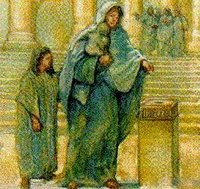radical giving
Still with the McClains today. It rained most of yesterday, but we enjoyed the day anyway, talking and reading. I made pizza last night. And now we're not leaving until tomorrow, since the Abbey can't host us until Sunday night. So we get to enjoy one more day on the farm.
Yesterday Paul and I read the story of the widow and the temple treasury. It reminded me of this entry from a couple years ago:
Jesus taught radical giving, making our work and even our possessions a gift to others, and taking the humble position of a servant, needy among the needy. But such giving is not respected. The ones who are praised are those who give large amounts, and who maintain their positions of wealth and power so they can continue to give. Isn’t that a more prudent way to help others?
Because it is the rich benefactor who can help the most people, not the poor servant—right? This seems to be the obvious conclusion when “helping” is measured in dollars or the number of people fed, clothed, or sheltered. But Jesus seemed to have a different view:Jesus said the poor widow put in more than all the rich people. And so set her as the example of how we are to give. The important thing is clearly not the monetary size of the gift, but whether or not the gift is all. Because it doesn’t take much faith to make a large contribution when there is plenty more left at home. But it does take great faith to give everything you have left, even if it is a small amount. And Jesus measures the value of our gifts by the faith behind them, not the number of dollars.He sat down opposite the treasury, and watched the multitude putting money into the treasury. Many rich people put in large sums. And a poor widow came, and put in two copper coins, which make a penny. And he called his disciples to him, and said to them, “Truly, I say to you, this poor widow has put in more than all those who are contributing to the treasury. For they all contributed out of their abundance; but she out of her poverty has put in everything she had, her whole living.” (Mk 12.41-44)
The value of the widow’s gift was in her faith and the love that moved her to give. Such faith opens us to God’s love, which is the highest good both for ourselves and as an example and encouragement to others, calling them also to faith. So we can see why [in his own life] Jesus chose the radical giving that demonstrated radical faith. And continued to demonstrate great faith by staying poor and dependent, in the position of a humble servant, continuing to give everything without concern for his own needs. This demonstration of faith makes the gift “more,” even if it is materially small.
It is not the size of the gift, but the faith that matters. Because God responds to faith with a wealth and power much greater than any human power. Like in the miracle of the loaves and fishes, when a small gift offered in faith (it was all the boy had) was many times multiplied by God, to provide all the food the crowd needed with much left over.
So we should not be deterred from radical giving, or embarrassed by the small gifts we can give as poor servants. God is not dependent on our wealth or power. God looks for the one who will give everything, depending completely on him.



 subscribe
subscribe